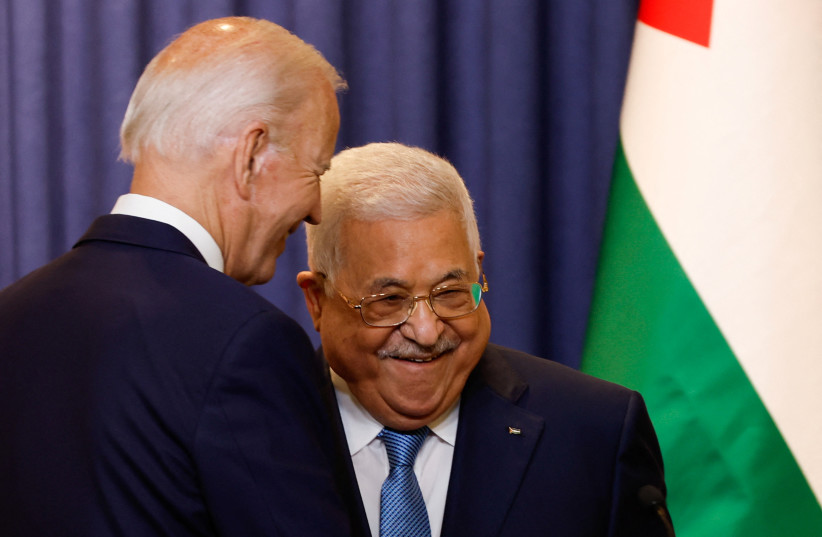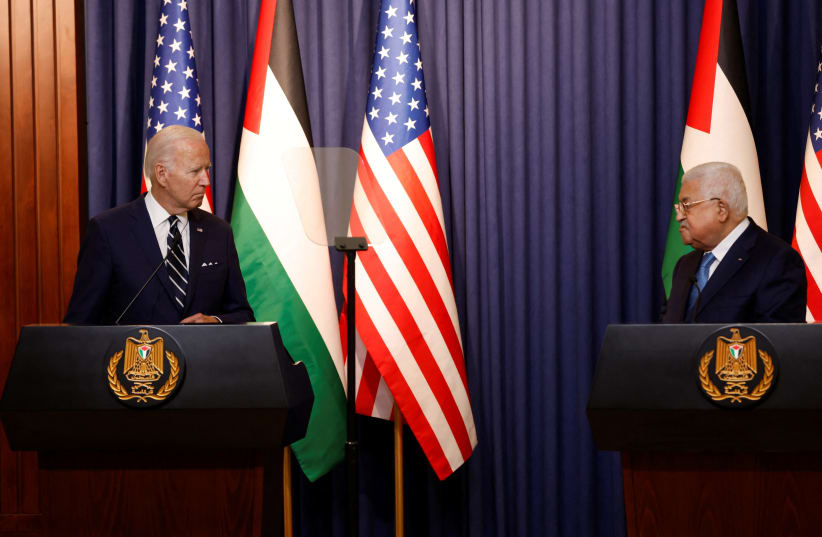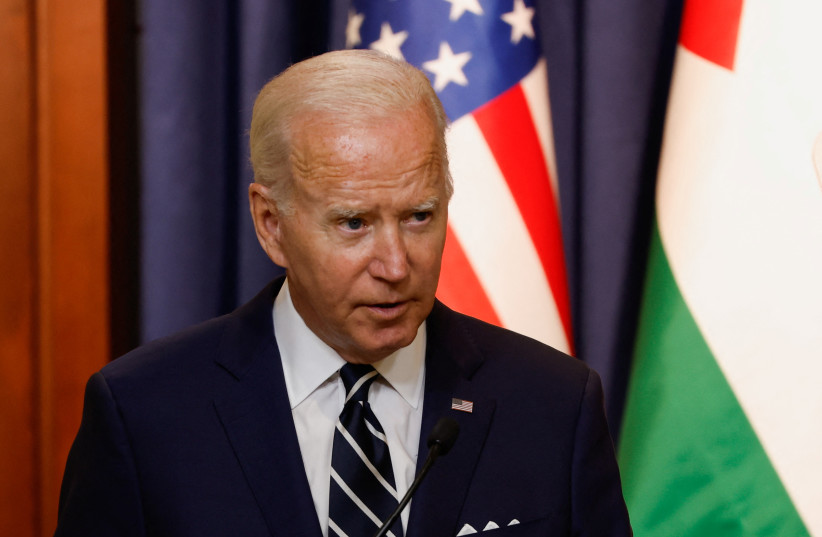US President Joe Biden pledged his support for a two-state resolution based on the pre-1967 lines with mutual land swaps, when he held a joint press conference with Palestinian Authority President Mahmoud Abbas on Friday in Bethlehem.
He did not cede to Abbas’s request to unilaterally recognize a Palestinian state, however, but spoke of a “future Palestinian state” with contiguous territory.
“Two states along the 1967 lines with mutually agreed swaps, remains the best way to achieve equal measures of security, prosperity, freedom and democracy for the Palestinians as well as Israelis,” Biden said.
“The Palestinian people deserve a state of their own that is independent, sovereign, viable and contiguous.”
When will Israel and the PA hold talks?

Despite this, he said, the ground is “not ripe” at “this moment to restart negotiations.”
The joint press conference was Biden’s last event of his three-day trip to Israel and the Palestinian territories.
Biden’s words fell far short of the Palestinian’s demands, which included the resumption of peace talks and unilateral, immediate recognition of a Palestinian state with east Jerusalem as its capital.
But his speech was markedly different from that of his predecessor Donald Trump, who in his visit to Bethlehem in 2017 didn’t even mention the words “two states” in his address.
Biden, unlike any of his predecessors since the 1993 Oslo Accords, has not pushed forward an Israeli-Palestinian peace process. In contrast, Trump spoke of a “Deal of the Century” he planned to conclude with Israelis and Palestinians.
The peace plan Trump unveiled recognized two states but ignored the pre-1967 lines. It spoke of a deal that gave Israel 30% of the West Bank and the Palestinians only a small fraction of east Jerusalem.
Biden, on the other hand, restored the two-state concept based on the pre-1967 lines, which had also been the policy of the Obama administration.
Abbas called for an end to Israeli “apartheid” and warned that the two-state solution would not be on the table forever, as he called on Israel to sit with him to make a “peace of the brave.”
“We are looking forward to the efforts of your administration to close the chapter of the Israeli occupation of our land and ending the act of racial discrimination, the apartheid against our people, and halt unilateral actions,” Abbas said.
The US has been blunt about its opposition to accusations of Israeli apartheid, but Biden did not respond to Abbas’s use of that language.
In his speech, Abbas urged the United States to unilaterally recognize the state of Palestine.
“The key to peace and security in our region begins with recognizing the state of Palestine and enabling the Palestinian people to achieve their legitimate rights in accordance with international legitimacy resolutions.”
Abbas said he looked forward to steps that America could take to strengthen its relations with the PA.
This includes the re-opening of both the US Jerusalem Consulate-General, which had been seen as a de-facto embassy for the PA, and the Palestine Liberation Organization office in Washington. Both offices were closed by the Trump administration.
Abbas asked the US to remove the Palestine Liberation Organization from its terror list, saying that “we are not terrorists.”
He also asked for those who killed Palestinian-American journalist Shireen Abu Akleh to be held responsible. The PA has accused the IDF of killing her while she was covering an IDF raid in Jenin.
Abbas assured Biden of the PA’s willingness to work with the US to achieve peace with Israel.
In describing the land of “the state of Palestine,” the PA president said it was “east Jerusalem as its capital on the 1967 borders” as he called for peace talks with Israel to achieve that two-state goal.
“The opportunity for a two-state solution on the ’67 border may be available today only; we do not know what will happen later,” he said.
“I extend my hand to the people of Israel to make peace of the brave,” so that there will be a better future for the young generations.
“It’s been 55 years [since 1967] and 74 since the Nakba. I ask you: When will the occupation end? When will our nation get its freedom and independence?”
Earlier in the day, Biden made waves when he visited an east Jerusalem hospital in an armored vehicle without an Israeli flag. The visit, the first one by an American president to an east Jerusalem location out of the Old City, was seen as a nod in the direction of acceptance of east Jerusalem as the capital of a future Palestinian state.
Later in the day, the White House issued a statement clarifying that Biden, in his conversation with Abbas, had underscored US recognition of Jerusalem as the capital of Israel.
The president “reiterated the US position that Jerusalem is the capital of Israel, and that it continues to be the policy of the United States that the specific boundaries of sovereignty in Jerusalem must be resolved through final status negotiations between Israelis and Palestinians,” the White House said.
“He further reaffirmed the need to preserve the historic status quo at the holy sites in Jerusalem, recognizing the Hashemite Kingdom of Jordan’s crucial role as custodian.”
But in his public remarks in Bethlehem, Biden spoke of Jerusalem as central to “the national visions of both Israelis and Palestinians” as he called on the need to uphold the status quo in the city’s holy sites.
Although he does not believe the time was right for Israeli-Palestinian peace, he said, it is possible to use Israel’s new ties with its neighbors to improve relations with the Palestinians.
“At this moment, when Israel is improving relations with nations throughout the region, we can harness that same momentum to reinvigorate the peace process between the Palestinian people and the Israelis,” Biden said.
To help improve Palestinian day-to-day life, Biden pledged an additional $200 million to the United Nations Relief and Works Agency (UNRWA).
Biden also referenced the pledge he made earlier in the day when he visited Augusta Victoria Hospital in east Jerusalem of $100 million for Palestinian health care services in east Jerusalem.
The United States has engaged with Israel on steps to improve life for Palestinians, Biden said, adding that this includes the provision of a 4G Internet system for Palestinians, renewable energy and freedom of movement for goods and people.
The president acknowledged the loss of Palestinian-American journalist Shireen Abu Akleh, who was killed in May while covering an IDF raid in Jenin. Washington has said that it is likely she was accidentally shot by an IDF soldier.
“She was an American citizen and a proud Palestinian. And she was performing very vital work on an independent media [outlet] and vital work of democracy,’ Biden said.
“The United States will continue to insist on a full and transparent accounting of her death, and we will continue to stand up for media freedom everywhere in the world.”
Biden also called on the Palestinian Authority to make reforms.
“Now is the time to strengthen Palestinian institutions; to improve governance, transparency and accountability,” he said.
“All of this work is critical. And it will help build a society that can support a successful, democratic future, and a future Palestinian state. And the United States will work with you, President Abbas, at every step.”

